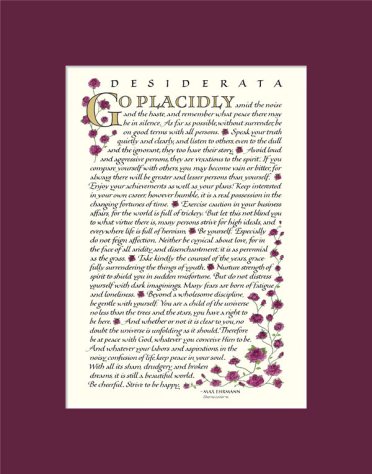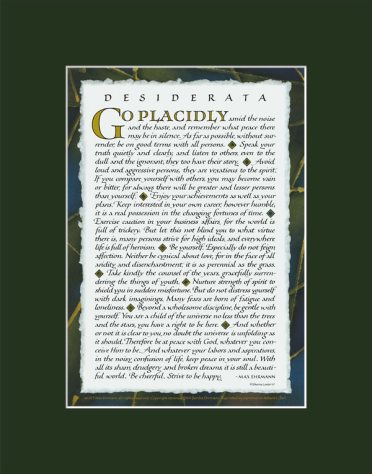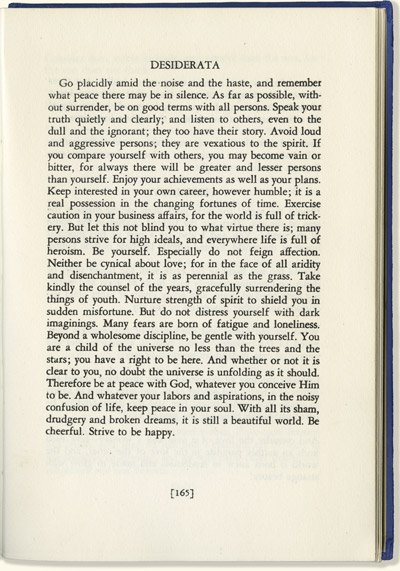Desiderata
Desiderata, which means “things that are desired,” was written by Max Ehrmann, “because it counsels those virtues I felt most in need of.” Since the early 1920s these words have been valued by countless people and rose in popularity in the late ’60s and early ’70s. It is making a strong comeback today, as parents and grandparents are passing along this wisdom to their loved ones.

Desiderata with Roses
Calligraphy Print
Size and color options available.
buy
Desiderata with Diamonds
Calligraphy Print
Size and color options available.
buy
GO PLACIDLY amid the noise and the haste,
and remember what peace there may be in silence.
As far as possible, without surrender,
be on good terms with all persons.
Speak your truth quietly and clearly;
and listen to others,
even to the dull and the ignorant;
they too have their story...
continue with the original text of Desiderata here
Desiderata and Old St. Paul’s Church
The history of the prose poem Desiderata is full of myth, legal proceedings and questions.
Legend has it that Desiderata was from “Old Saint Paul’s Church,“ that it was inscribed on the wall of the church in the late 17th century. The real story is that the Rev. Frederick Ward Kates, the rector of the church from 1956 to 1961, used the words of Desiderata in a mimeographed booklet he gave to his parishioners to read. On the cover of the booklet was the church’s name and year it was founded: “Old Saint Paul’s Church, Baltimore, 1692.” The two became linked together and still today it is hard to tear them apart.
A Baltimore authority on early English literature said, “This work, as it reads now, was not written in 1692. The words are not those of the seventeenth century, nor is the composition.”1
Desiderata Copyright Issues
Max Ehrmann obtained federal copyright No. 962402 on the words (then untitled) on January 3, 1927 under the name of “Indiana Publishing Company;” Mr. Ehrmann bequeathed the copyright to his widow Bertha upon his death in 1945; Bertha Ehrmann renewed the copyright in 1954; Bertha Ehrmann bequeathed the copyright to her nephew Richmond Wight upon her death in 1962; Richmond Wight assigned the copyright for value to Robert L. Bell in 1971.2
Mr. Bell acquired the copyright to Desiderata at great financial risk. “At the time,” recalls Bell, “I was president of Bruce Humphries, a publishing company that was starving for lack of capital, which owned the publishing rights to Desiderata and which owed me $16,000 in back salary. I was having an incredible struggle trying to support my wife and four children, one of whom was in college. I owned loans against Bruce Humphries and, in a court procedure, agreed to relinquish my liens in exchange for the publishing rights to Desiderata. Then I took every cent I had and bought the copyright from Richmond Wight, nephew and heir to the Ehrmann works.”1
HOW LONG DOES A COPYRIGHT LAST?
Up until 1998, a work was copyrighted in the U.S. for 75 years from the original copyright date. Later that year, the Sonny Bono Copyright Term Extension Act added twenty years to the term of works that were still protected by copyright.3 This would make Desiderata, which was copyrighted in 1927, copyrighted until 2022.
HOWEVER…
Copyrights need to be protected, and herein lies the problem: Did Max Ehrmann protect his own copyright? According to the legal case of Robert L. Bell v. Combined Registry Company in 1975 over the publication of Desiderata in Success Unlimited magazine, there have been several instances where the copyright had not been protected. One was when Mr. Ehrmann used Desiderata as a Christmas greeting card in 1933 without a copyright notice. In another instance in correspondence between Merrill Moore, an Army psychiatrist, and Ehrmann, Moore said,
“I think you should know that nearly every day of my life I use your very fine prose poem Desiderata in my work . . . Here I have found your philosophy as useful and have used it considerably as part of the psychotherapy I am doing . . . I must have given away a thousand copies in the last few years.” (Printed without copyright notice.)2
“The court’s findings were that Max Ehrmann abandoned his copyright protection. The acts of sending out Christmas cards and authorizing Moore’s distribution certainly are strong evidence that the author did not endeavor to protect a commercial property. Even in his diary, the author opines that he has left a ‘gift’ to the world.”2
A similar outcome against Bell was reached in a second court appearance in 1976.4 And yet, Robert L. Bell brought others to court for infringement of copyright and won cases, including one against Warner Brothers for the poem-song Desiderata, produced by Fred Werner and narrated by Les Crane, which won the Grammy for Spoken Word Recording in 1971. Mr. Bell continued to protect the copyright and collect royalties until his death in 2009.5
Desiderata Original Text
There are many versions of Desiderata. Some have punctuation variations or small changes in wording. But the question, which often arises, is whether the second to last sentence should read, “Be cheerful” or “Be careful?” The first published copy of Desiderata is in The Poems of Max Ehrmann, edited by Bertha Ehrmann, published by Bruce Humphries, Inc. in 1948. In this original version the words are, “Be cheerful,” which is more in the spirit of Ehrmann’s writings. See book page below.
Article by Sherrie Lovler
Sources
- McGarrity, Sam. “The Misplaced Masterpiece—Few people seem to know who wrote it—or when” Guideposts
- Bell v. Combined Registry Company, 397 F. Supp. 1241 (N.D. Ill. 1975)
- The myth of the pre-1923 public domain — LibraryLaw Blog
- Bell v. Combined Registry Company, 536 F.2d 164 (7th Cir. 1976) Argued Feb. 17, 1976. Decided May 14, 1976. Rehearing Denied July 15, 1976.
- Correspondence between Robert L. Bell and Sherrie Lovler
- The Poems of Max Ehrmann edited by Bertha Ehrmann published by Bruce Humphries, Inc. 1948
- Katz, Barbara. “Popular Prose-Poem Is No Work of the Ages.” The Washington Post November 27, 1977
- Bennett, Mark. “Max Ehrmann: ‘A rare Man’ one of Terre Haute’s most memorable” News From Terre Haute, Indiana September 5, 2009
- Dean, Paul. “Best-selling poem’s true author revealed.”
Desiderata Original Text

From The Poems of Max Ehrmann edited by Bertha Ehrmann
published by Bruce Humphries, Inc. 1948
Desiderata Prints and Posters
The original art of these Desiderata prints and posters are in beautiful calligraphy by Sherrie Lovler. Each letter is carefully crafted paying close attention to both the letter form and the space between the letters. Sherrie created the lettering style to be easy-to-read at any size reproduction.
Seeing a need for both feminine and masculine versions, Sherrie designed one with roses and one with a torn paper look with diamonds and a border. The rose version has six choices of flower colors, the diamond one comes in dark blue or green. They are then made into either lithographs or giclée prints, on archival paper with lightfast inks.
The care Sherrie takes in creating the work is matched with the care she takes in matting and framing. All acid-free mats and backing board are used and the frames are solid wood. The matted prints come packaged in a plastic slip. The framed prints are protected with glass and double boxed, ready to give as a gift to make you proud or to hang on your own wall.
Special Features
- The original piece is hand lettered calligraphy — not type
- Designed by an award-winning artist
- Feminine and masculine versions
- Matted, framed prints and poster sizes
- 86 different options of designs, sizes, colors and frames
- Museum quality—will last for generations
- Mats are acid-free
- Frames are solid wood
- Made in California
- Personally owned and managed business
- There’s a real and caring person on this end
- Your satisfaction is our goal
